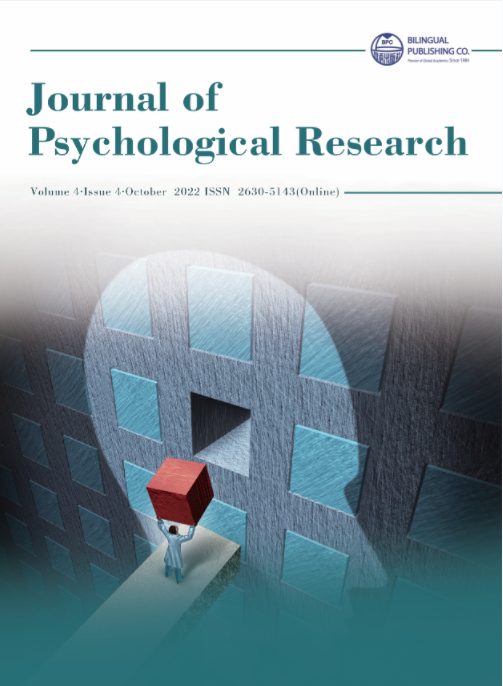-
701
-
602
-
393
-
301
-
291
Assessing the Impact of the “Two-child Policy” in China: The Effects of the Second Child on the Growth of Teenagers
DOI:
https://doi.org/10.30564/jpr.v4i4.4956Abstract
Purpose: China’s new universal two-child policy has brought a baby boom of the second child in 2016. With the changing family structures, elder children in adolescence may have more and more emotional and even psychological problems such as “two-child syndrome”. This paper aims to explore the “influence factors and mechanism of the second child on the growth of teenagers” and has great practical significance to promote the physical and mental health of teenagers and the harmony of two-child families. Design/methodology/approach: By means of literature analysis, in-depth interview, questionnaire survey and statistical analysis, the elder children aged 12 to 18 in the two-child family were taken as the main body of the survey, and an empirical research based on NLP understanding hierarchy theory was carried out. Major Findings: (1) The most significant influence on the growth of teenagers is the attitude of parents, and then the gender of the first child. (2) Parents’ favouritism towards the second child would lead to decline in the first child’s academic performance. (3) The higher the family income, the less the influence on the first child’s life. (4) When the age difference is large, the first child and the second child are not easy to have conflicts. Practical implications: Parents should try to treat any children equally. Parents should pay attention to the sibling relationship of their two children with small age gap. Parents who have two children with a large age gap should properly guide the elder child to help take care of the younger brother or sister. Originality/value: This study contributes to the growing literature focusing on the influence factors and mechanism of the second child on the growth of teenagers in the context of China’s new universal two-child policy. It adds some early empirical insights on the physical and mental health of teenagers in twochild families.Keywords:
Universal two-child; Growth of teenagers; Empirical research; NLP understanding hierarchy theory; Econometric modelReferences
[1] Lopez, F.Z., Veiga, C.R., 2020. From One Child to Two: Demographic Policies in China and their Impact on Population. Revista Espanola de Investigaciones Sociologicas. 172, 141-160.
[2] Cheng, C.H., 2021. A Study on the Influence of Family Upbringing Style on Teenagers’ Mental Health. Journal of Psychological Research. 3(2), 19-22.
[3] McCann, 2021. The insights of local culture: The truth about GEN Z in China, White paper, McCann World Group.
[4] Fan, M.J., 2016. Effects of the “One-Child” Policy and the Number of Children in Families on the Mental Health of Children in China. Revistade Cercetare si Interventie Sociala. 52, 105-129.
[5] Jiang, X.H., 2017. Analysis & Research on the Current Situation of Adolescent Behavior Habits of the Elder Children in Two-child Families. Test Questions and Research: Teaching Forum. 34, 46-47.
[6] Zhang, D.N., 2019. Analysis on the Causes of Psychological Problems of the Elder Child in the Background of the Second Child. Writers’ World. 11, 195- 196.
[7] Zou, B.X., Zhang, G.L., 2019. Adaptability Problem and Reflection Behind the “Peeping” Behavior of the Elder Children in the Two-child Families. Journal of Shaanxi Preschool Normal University. 35(11), 7-12.
[8] Sun, Y., Fu, L.J., Li, M.J., et al., 2020. Research & Intervention Measures on the Influence of the Twochild Policy on the Behavior and Psychology of the Elder Children. Journal of Chinese Physician. 22(8), 1264-1266.
[9] Guo, L.L., 2021. Countermeasures & Analysis on the Psychological Influence of the First-born Children in the Sibling Relationship under the “Universal twochild” Policy. Nei Jiang Science & Technology. 2, 135-136.
[10] Zhang, Y.H., 2019. Study on the Intervention of Satir Family Therapy Model in Parent-child Conflicts in Two-child families. Master’s Thesis, Zhengzhou University.
[11] Peng, Y.T., 2020. The Influence Mechanism of Birth Order of the Two-child Families on Middle School Students’ Mental Health. Master’s Thesis, Shanghai Normal University.
[12] Zhang, A.R., 2021. An Empirical Study on the Attitude Towards Having Two Children in Post-95 Generation - A Case Study of Hangzhou. Statistics and Management. 6, 81-87.
[13] Hu, S.L., 2016. A Study on the Views of Chinese Teenagers on the “Two-child problem” - A Case Study of Yichang City, Hubei Province. Digest of Management Science. 22, 68-70.
[14] Wang, N., Qu, G.Q., 2018. Teenagers’ Views on the Universal Two-child Policy and the Corresponding Countermeasures. Modern Communication. 1, 237- 238.
[15] Hu, Y., Shi, X.Z., 2020. The Impact of China’s Onechild Policy on Intergenerational and Gender Relations. Contemporary Social Science. 15(3), 360-377.
[16] Xiao, Q., Wang, Y.L., 2020. The Influence of the Intergenerational Housework Support on the Second Child Bearing of the Family. Technology and Industry. 12, 200-204.
[17] Li, M., Yan, L., Meng, R., 2020. Analysis on the Influence and Factors of the “Universal Two-child” Policy on the Fertility Willingness of the New Generation Women from the Perspective of Work and Family Balance. Technology Wind. 5, 212.
[18] Jia, N., Zhou, Y., Yang, T.C., 2021. What is the Influence of the Second Child Bearing on Household Financial Asset Allocation-Evaluation of Quantitative Effect and Policy Effect. Finance and Economics. 1, 16-28.
[19] Grimley, B., 2016. What is NLP? The development of a grounded theory of neuro-linguistic programming (NLP), within an action research journey. International Coaching Psychology Review. 11(2), 54-66.
[20] Li, S.P., 2018. A Brief Analysis on Two Children Policy Being out of Favor under Current Social Situation. The Farmers Consultant. 15, 260-261.
Downloads
How to Cite
Issue
Article Type
License
Copyright © 2022 Yiting Dong, Xiao Xiao

This is an open access article under the Creative Commons Attribution-NonCommercial 4.0 International (CC BY-NC 4.0) License.




 Yiting Dong
Yiting Dong





